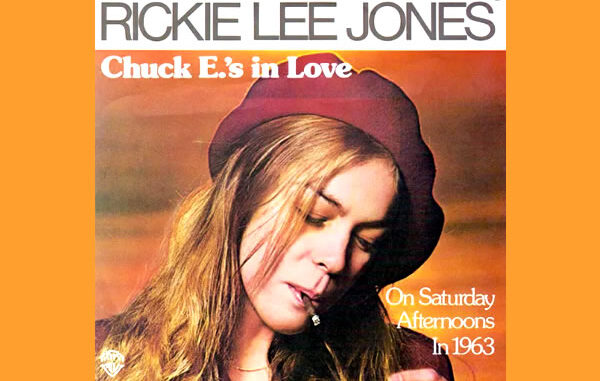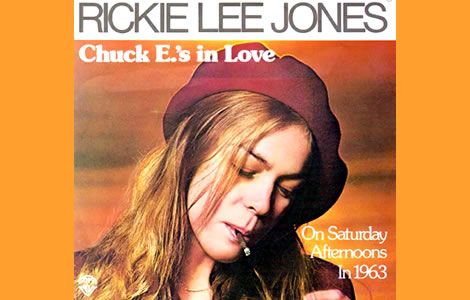
“Chuck E.’s in Love,” the debut single by Rickie Lee Jones, was released in 1979. This song not only marked the emergence of a unique voice in the music industry but also became an anthem of the late 1970s.

Its success across various charts, coupled with the social and cultural backdrop of the time, underscores its enduring appeal.
Chart Success in the US, UK, Europe, Asia, and Australia
“Chuck E.’s in Love” quickly climbed the charts, demonstrating broad appeal across multiple continents. In the United States, the song peaked at No. 4 on the Billboard Hot 100 and remained on the chart for several weeks, cementing Jones’s place in the music industry.
The song’s catchy melody and Jones’s distinctive voice resonated with American audiences, leading to significant radio play and strong sales.
In the United Kingdom, “Chuck E.’s in Love” also enjoyed considerable success, reaching No. 18 on the UK Singles Chart.
The song’s blend of jazz, pop, and folk elements appealed to British listeners, who were increasingly open to eclectic and genre-blending music during this period.
In Europe, the single charted well in several countries. It reached the Top 10 in the Netherlands and Belgium, where Jones’s unique style found a receptive audience. In Germany and France, the song received substantial airplay, contributing to its popularity across the continent.
In Australia, “Chuck E.’s in Love” peaked at No. 11 on the Kent Music Report, while in New Zealand, it climbed to No. 8. The song’s laid-back, jazzy vibe suited the tastes of listeners in these regions, who embraced Jones’s storytelling and musicality.
In Asia, particularly in Japan, the song garnered a cult following.
Although it didn’t achieve the same chart-topping success as in Western countries, it became a favourite among fans of Western pop music and has maintained a lasting presence in the region’s music culture.
Other Hot Acts Charting at the Time
The late 1970s was a vibrant period in music, characterised by a mix of disco, rock, and emerging new wave sounds.
During the time “Chuck E.’s in Love” was climbing the charts, several other notable acts were also enjoying significant success.
- Donna Summer: The Queen of Disco was ruling the charts with hits like “Hot Stuff” and “Bad Girls,” both of which were major successes in 1979. Her sultry voice and disco beats were a staple of the era’s dance floors.
- The Bee Gees: Following the success of the “Saturday Night Fever” soundtrack, the Bee Gees continued to dominate with hits such as “Tragedy” and “Too Much Heaven.”
- Blondie: With their blend of punk, new wave, and pop, Blondie was making waves with hits like “Heart of Glass” and “One Way or Another.”
- Michael Jackson: Although his major breakout with “Thriller” was still a few years away, Jackson was beginning to make a name for himself as a solo artist with songs like “Don’t Stop ‘Til You Get Enough.”
- Pink Floyd: The progressive rock band was at the height of their popularity with the release of “The Wall,” featuring the iconic single “Another Brick in the Wall (Part 2).”
- Supertramp: Their album “Breakfast in America” was a massive success, with singles like “The Logical Song” and “Goodbye Stranger” topping the charts.
The Cultural and Social Backdrop in the US and UK
The year 1979 was a time of significant cultural and social changes in both the United States and the United Kingdom.
United States:
- Political Climate: The US was dealing with the aftermath of the Watergate scandal and the Vietnam War, leading to a general sense of disillusionment with politics. President Jimmy Carter was in office, facing challenges such as the Iran hostage crisis and economic difficulties.
- Economic Issues: The country was experiencing high inflation and unemployment, contributing to a sense of economic instability.
- Cultural Shifts: The late 70s saw the decline of the disco era and the rise of punk and new wave music. There was a growing interest in more authentic and diverse musical expressions, which helped artists like Rickie Lee Jones gain traction.
United Kingdom:
- Political Landscape: The UK was undergoing significant political changes with the election of Margaret Thatcher as Prime Minister in May 1979. Her policies would go on to shape the country for the next few decades.
- Economic Struggles: Like the US, the UK faced economic challenges, including high inflation and unemployment. Strikes and industrial action were common, reflecting widespread dissatisfaction.
- Music and Culture: The UK music scene was vibrant and diverse, with punk and new wave movements challenging the status quo. Artists like The Clash, The Sex Pistols, and Elvis Costello were making headlines and influencing the cultural landscape.
Enduring Legacy and Adaptation to MTV
“Chuck E.’s in Love” has maintained its status as a classic favourite over the years.
The song’s timeless appeal lies in its catchy melody, relatable lyrics, and Jones’s charismatic delivery. With the advent of MTV in the early 1980s, music videos became an essential part of an artist’s success.
Although “Chuck E.’s in Love” was released before MTV’s launch, its engaging and narrative-driven video found a new audience on the channel, contributing to its lasting popularity.
Rickie Lee Jones’s debut single remains a standout track from the late 1970s, reflecting the era’s eclectic musical landscape and resonating with listeners across generations.
Its success on international charts, coupled with the dynamic cultural and social backdrop of the time, underscores its significance in music history.
